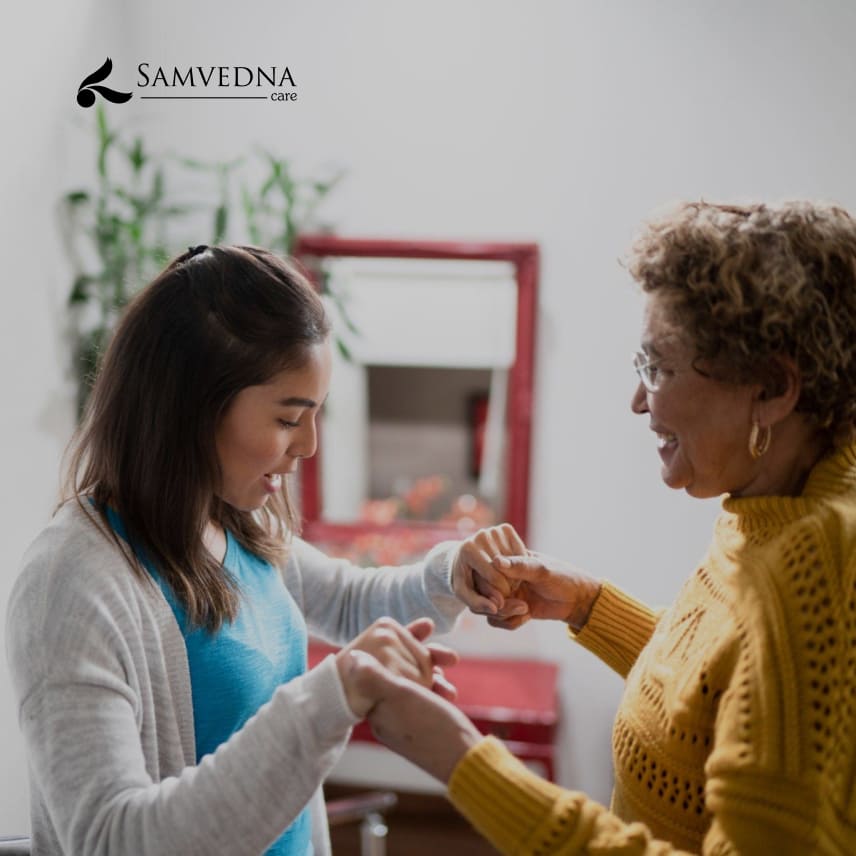Contact Us




Parkinson’s is a progressive disease which is caused by a loss of nerve cells in the brain. There is currently no cure for Parkinson’s disease, but treatments are available to help relieve the symptoms and maintain the quality of life.
Parkinson’s disease has both motor and non-motor symptoms. Medication can be used to manage the motor symptoms of Parkinson’s disease such as tremors and other movement problems. However, by the time classic motor symptoms of Parkinson’s disease show up, a significant loss of brain cells and functions have already occurred. Scientists are investigating ways to detect early signs of the disease, to potentially stop or slow the progression.
Samvedna elder care services support the individual living with Parkinson’s and their caregivers through holistic care by health care professionals.
For managing non-motor symptoms, non-pharmacological therapies and interventions can be useful. They can help improve the patient’s quality of life by minimizing the impact of the symptoms on the body and the mind. Non-pharmacological interventions may include:
Mindfulness
Research shows that mindfulness interventions tailored for Parkinson’s disease are associated with reduced anxiety, depression and improved cognitive functioning. Thus, it helps with
• Improving balance, and increasing confidence.
• Accepting tremors, finding more ease and peace.
• Preventing burnout, connecting with the world and those around.
• Engaging with “small” and meaningful things in life, enjoying life more.
• Finding meaning in life, not letting the disease control one’s life.
Mindfulness is the practice of being fully present, aware of where you are, what you’re doing, and fully immersing yourself in the moment, non-judgementally.
Mental health therapists support practicing mindful eating, being mindful in your interactions, engaging in your daily activities mindfully by using all your senses and letting go of thoughts or any ruminations, taking multiple pauses during the day and just focusing on your breath.
Occupational Therapy
Daily tasks for persons with Parkinson’s may get more challenging as the disease worsens. In addition to enhancing their quality of life, occupational therapy can assist patients in managing daily tasks and preserving their independence for as long as feasible. Occupational therapists can recommend assistive technology to patients and make sure they can utilise it properly.
Physiotherapy
The multimodal strategy used to treat the symptoms of Parkinson’s disease includes physical therapy. Exercises can be useful in increasing and maintaining muscular strength and conditioning to ease mobility issues. It can also target problem areas including leg and hand stiffness, tremors, and balance.
Exergames
Exergames, or exercise video games, have gained popularity in recent years as a fun and convenient way to get a workout at home. However, they are more than just a fun way to break a sweat – exergames can also benefit people with Parkinson’s disease.
Parkinson’s disease is a progressive neurodegenerative disorder that affects the nervous system, leading to symptoms such as tremors, stiffness, and difficulty with movement. Exercise has been shown to help manage these symptoms, and exergames provide a unique opportunity to get a workout in a safe and controlled environment.
Exergames are designed to be interactive, engaging, and challenging, which can help people with Parkinson’s disease improve their physical and cognitive abilities. For example, some exergames incorporate balance exercises, which can be particularly beneficial for people with Parkinson’s who may have difficulty with balance and coordination.
In addition to physical benefits, exergames can also have mental health benefits for people with Parkinson’s disease. Many exergames incorporate mindfulness techniques, such as deep breathing and meditation, which can help reduce stress and improve overall well-being. Studies have also shown that exergames can improve mood and cognitive function in people with Parkinson’s disease.
Diet and Nutrition
There is evidence to suggest that diet and nutrition can play a role in managing the symptoms of Parkinson’s disease. A diet rich in fruits, vegetables, and whole grains has been found to be beneficial. Foods high in antioxidants, such as blueberries, strawberries, and spinach, can help protect the brain from damage. Avoiding processed foods and foods high in saturated fats is also important.
Mental Health Support
Parkinson’s disease can have a significant impact on mental health. People with Parkinson’s disease are at an increased risk of developing depression and anxiety. It is important to seek support from mental health therapists, if you or a loved one are struggling with your mental health. Support groups can also be helpful for people with Parkinson’s disease and their caregivers.
Elder Care Home Services
Samvedna elder care services can provide assistance and support for people with Parkinson’s disease who need help with activities of daily living. Although, such interventions are safe, but it is best to consult your physician before starting any intervention or treatment. These interventions can be used as complementary therapies to the pharmacological treatments prescribed by doctors, and not as an alternative to medication. At Samvedna Care, we have a multidisciplinary team of experts, who provide holistic care and our specialists are available for consultations on an appointment basis.